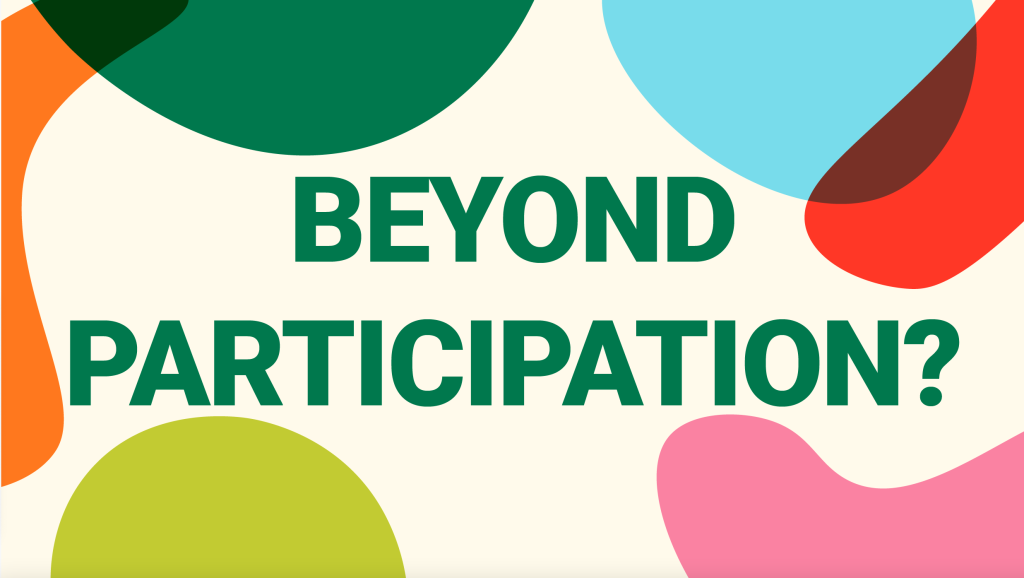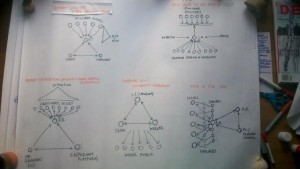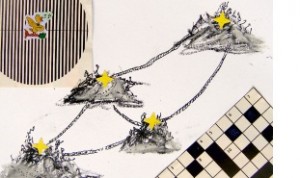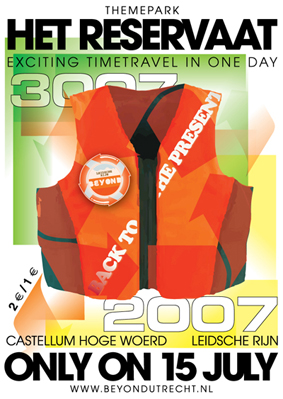Manual Labours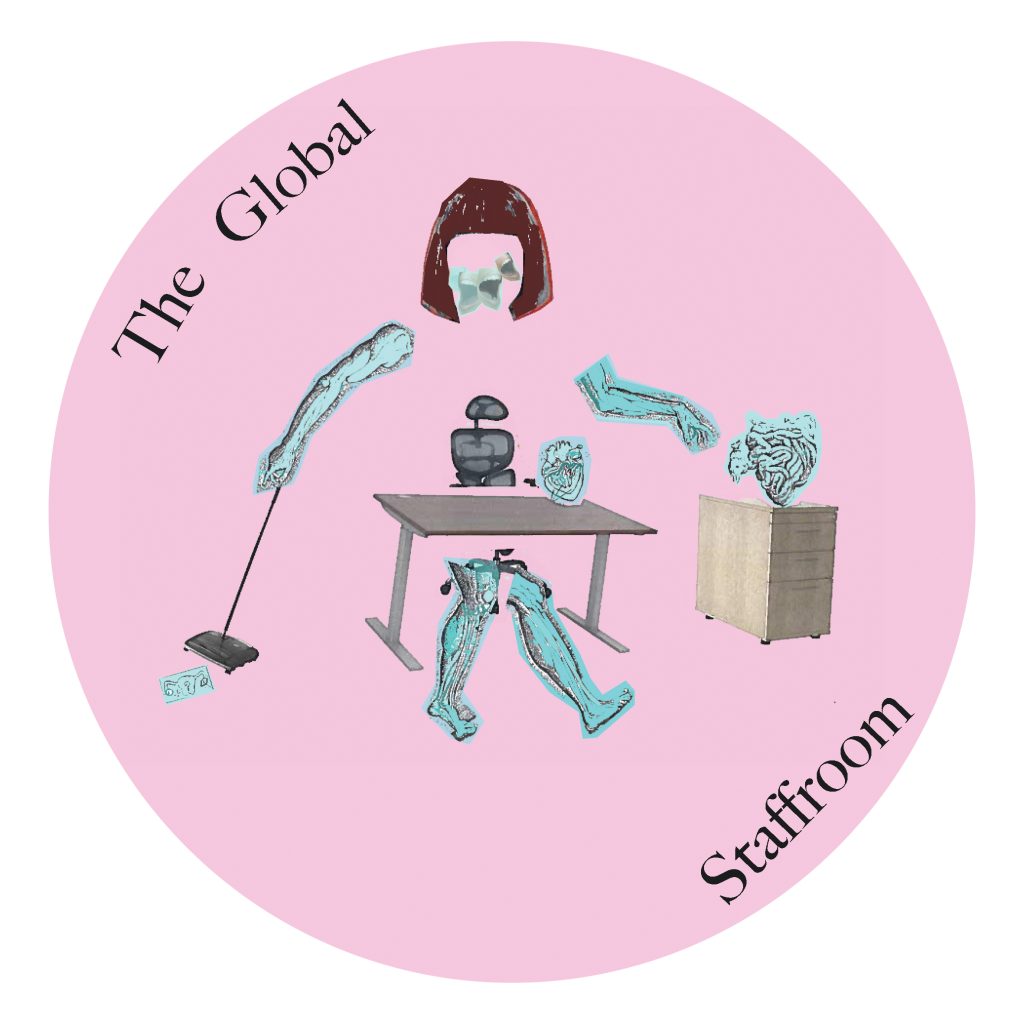
2013-ongoing
A long-term practice-based research project with Jenny Richards exploring physical and emotional relationships to work. This project reconsiders current time-based structures of work (when does work start and end?) and reasserts the significance of the physical (manual) aspect of immaterial, affective and emotional labour. Manual Labours’ started in 2016 with a 35 hour ‘working week’-long investigation into the embodied, sensory, emotional affects of work. We have explored complaining bodies and bodies as buildings, each phase resulting in a manual and public manifestation. We are continuing to work on the theme of staffrooms and produced Manual Labours Manual #5 (prototype 1 and prototype 2); created a series of listening station installations; written an article and consulted with activists, researchers, artists and educators to develop a series of proposals for distributed, mobile, covert and permanent staffrooms.
More information can be found at: www.manuallabours.co.uk/
Cards on the Table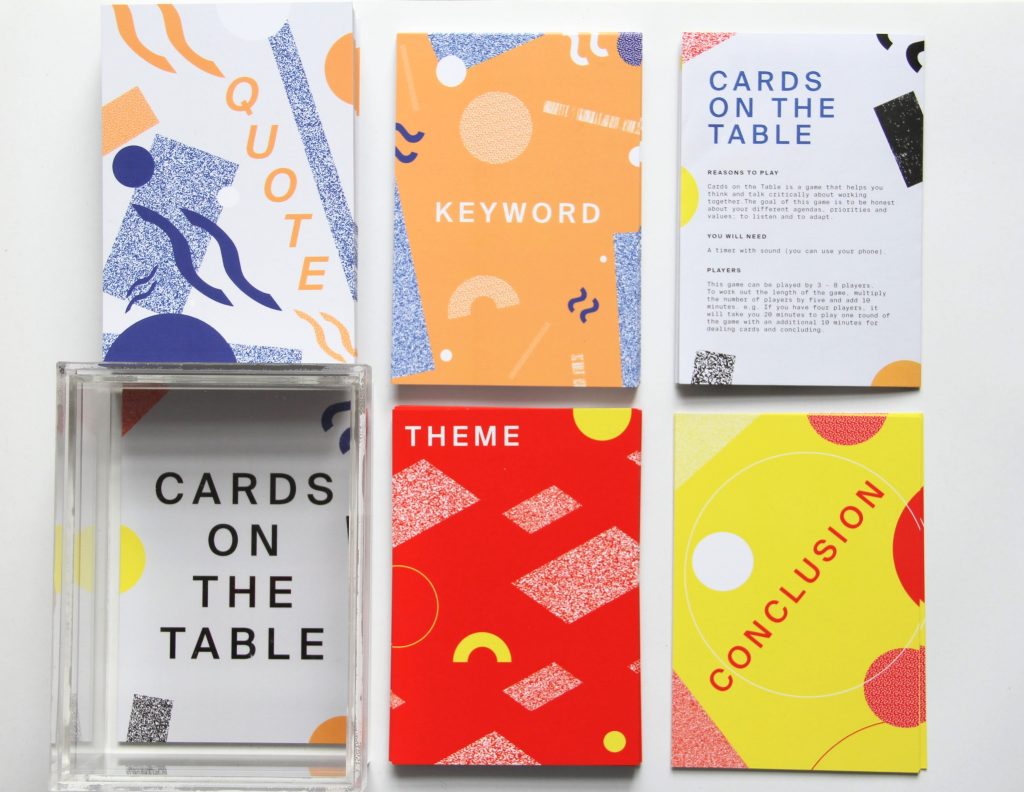
2016-ongoing
Cards on the Table (COTT) is a participatory research method, that is used to evaluate the experiences of participation and co-creation in participatory arts projects. The card game was created to encourage critical thinking around troublesome issues that arise at the beginning, middle or end of a project. Designed by Ania Bas, Sian Hunter Dodsworth, Sophie Mallet, Sophie Hope and Henry Mulhall, COTT has been in use since 2016 in a variety of community, arts, and organisational contexts.
More information, including a blog with interviews with other card-game makers, COTT players and alternative evaluation inventors can be found at www.cardsonthetable.org
Beyond Participation?
Together with Henry Mulhall I led the evaluation of BE PART, a 4-year project co-funded by the Creative Europe Programme of the European Union. BE PART, is a network of arts organisations from across the EU (and Tunisia) working to understand and broaden participation in arts and culture. Beyond Participation? is our free downloadable PDF report of our evaluation, designed by Studio Hyte. The report contains information about BE PART, our evaluation methods, findings, diagrams, examples of Fieldworks, and recommendations. We share what we have learnt about the difficulties of moving from participatory to co-created approaches at a project and organisational level. We hope this document will be useful to anyone practising, organising, researching, teaching and exploring how to work together.
The report and more information can be found at: https://beyondparticipation.eu/report/
Corkscrew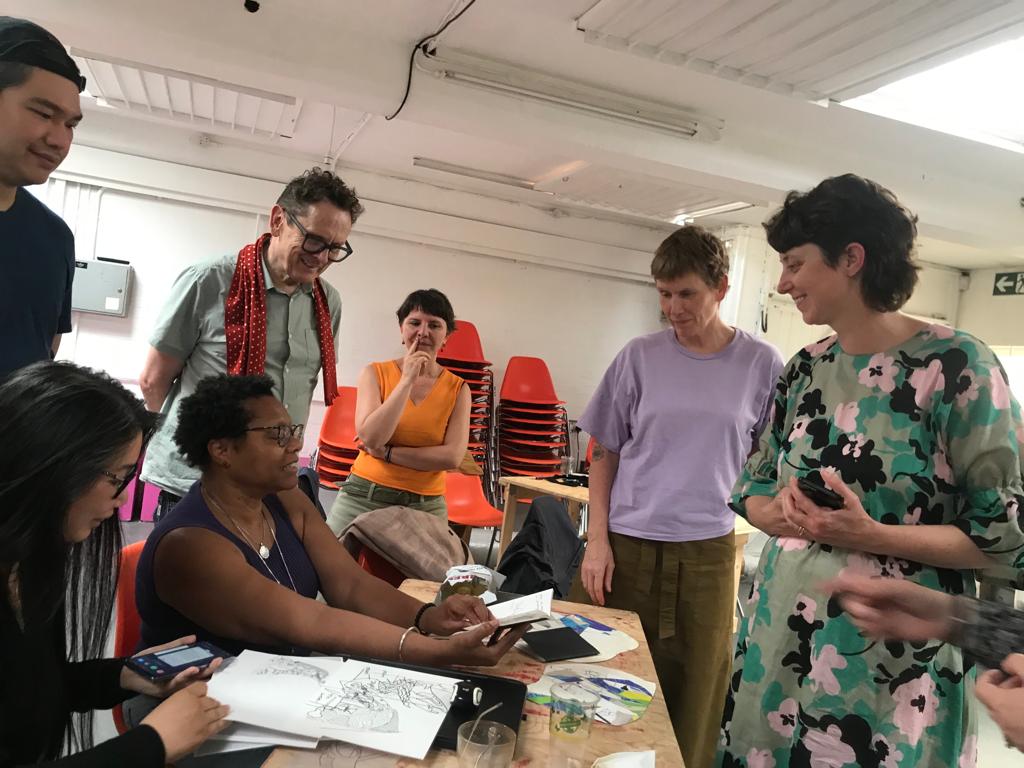
2013-2023
Corkscrew was a network for practice-based/led research students and staff that began in the School of Arts at Birkbeck in 2013. It was set up by Dr Carol Watts, myself and practice-research PhD students at the time. It was named Corkscrew because of the spiralling feedback loop between practice-based investigation and critical/reflective work.
The Corkscrew group would meet regularly to share experiences of being a practitioner-researcher in an academic context. Students led discussions, showed examples of their practice (in termly ‘show and tell’ sessions) and engaged in group crits which foregrounded practice. There was also a programme of guest lectures and workshops led by experienced researchers from different arts fields. Students and staff carrying out practice-research at Birkbeck came from a variety of disciplines, including fine art, curating, film, media, creative writing and performance.
More about the events and discussions can be found at: https://corkscrew.sophiehope.org.uk/
Meanwhile in an Abandoned Warehouse (miaaw.net)
2018-ongoing

Since 2018 I have been publishing weekly podcasts with Owen Kelly about community, creativity, cultural democracy and the commons. Alongside episodes where Owen and I in conversation, talking to ourselves or interviewing other people, Arlene Goldbard and François Matarasso host the monthly episode, A Culture of Possibility, where they interview artists and cultural activists from Europe and America about their work and Hannah Kemp-Welch presents a regular slot called Ways of Listening about the importance of hearing and listening in creative community activity.
Sign up to our monthly newsletter to find out more: https://buttondown.email/miaaw.net
Social Art Maps
Social Art Map is a method for facilitating and capturing multiple, contrasting experiences of socially engaged art. By bringing together artists, participants, collaborators, curators and commissioners around a long piece of paper, we trace the diverse experiences together of the beginnings, middles and ends of a process. The initial Social Art Map focuses on the timelines of 5 projects that took place in London and was developed in collaboration with Emily Druiff (Peckham Platform) supported by funding from Creativeworks London. The second Social Art Map focuses on the four projects commissioned as part of Out of the Ordinary in Swale and Medway, Kent (a Creative People and Places project).
The edited results are published as posters. To receive free copies, contact sophiehope[at]me.com
1984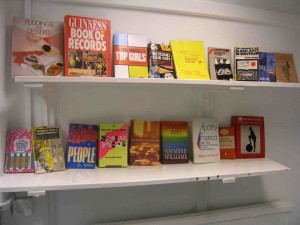
2011-ongoing
Using the method of the dinner party I have been inviting guests who were artistically and politically active in the 1980s to come together and experiment in collective time travel to the year 1984. The website documents dinners in London, Singapore, Melbourne, Johannesburg and Montevideo.
Critical Work?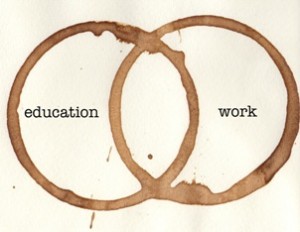
2013-2015
A research project with Lorraine Lim about credited work placements on postgraduate arts courses in London. The first part of this project involved mapping the current literature and best practice guidelines on work placements and employability within higher education. This document, ‘Critical Work? Postgraduate Credited Placement in the Arts‘, aims to provide a starting point for a conversation with higher education placement tutors, postgraduate students and host arts organisations. The second phase involved a closer look at five case studies involving a one-day workshop with a selected group of students, placement tutors and representatives from host organisations.
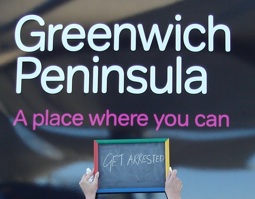
Critical Friends
October 2008-2011
A project investigating, critiquing and feeding into the commissioning of public and collaborative art on the Greenwich Peninsula commissioned by Stream.
Radio plays
I have written 2 community radio plays with Take a Part in Plymouth. The first, called The Wild Spirits if Efford, was produced as part of Efford FM commissioned by Heart of Efford Community Partnership. For my second radio play in 2012 I worked with foley artist Jo Bannon and sound artists Mark Vernon and Neil Rose who recorded and produced the play which was recorded live in North Prospect, Barne Barton, Whitleigh and Efford as part of Nowhereisland Radio, a four way cross community project in response to the cultural olympiad commission ‘Nowhere Island’. The play is about a brave but thirsty tribe still living on the four remaining islands of Dumnonia who become addicted to fertilizer, a gift given to them by the Quontock Economists…
Contact sophiehope[at]me.com if you would like CD recordings of these plays.
sayingno
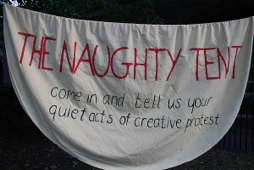
August-October 2010
A project with Leila Galloway and residents of Crossfields Estate as part of Deptford X Festival about quiet acts of creative protest in the everyday.
Het Reservaat
Het Reservaat took place in Leidsche Rijn, a new town being built near Utrecht, The Netherlands, as the result of a residency I did there in 2006-7. The performance was a one day open-air museum of life in 2007 seen from the perspective of people living in the year 3007, as if remnants of the town had been re-discovered and brought to life in a living history museum. Over 500 residents of Leidsche Rijn arrived at the entrance of the museum throughout the day and were encouraged to think they were living in the year 3007 enjoying a day at a ‘reservation’ depicting everyday life in 2007. They were given a guided tour around fifteen scenes devised and performed by different interest-groups living in Leidsche Rijn, who carried out their everyday activities, such as practicing tai chi, discussing ‘democracy’, performing music, feeding animals, filling a car with petrol, playing board games and drinking coffee (about 100 people were involved in ‘performing’ on the day). Each of these everyday scenes was slightly exaggerated or misinterpreted by the performing guides, echoing the improvisation often required to interpret life in the distant past. Putting these everyday scenes together, slightly exaggerating or misinterpreting them, combining absurdity with celebration, aimed to provoke residents of this new town to question their ways of living in contemporary society.
Performative Interviews
A series of filmed interviews with artists, commissioners and curators in disguise about the things that go wrong in the art commissioning process.
